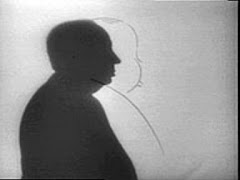I saw The Dark Knight yesterday. Yes, I know, I was a tad late in so doing, for a researcher of contemporary cinema, but, in my defence, it's been a busy summer of moving house and jobs...
Anyway, I found it such an interesting film and think it a perfect candidate upon which to pin a whole series of blog posts, over the coming weeks, on the notions of 'good' and 'bad' film directing, of which this is but the first instalment. I've been preparing the ground for this in my recently posted discussions of the practice of film directing (see HERE and HERE).
As in those earlier posts, I will be elaborating on the insights about film directing set out by Victor Perkins in his brilliant chapter 'Direction and Authorship', in Film as Film (London: Penguin, 1972), as well as in his great essay on film directing 'Moments of Choice', available online HERE.

Despite the fact that The Dark Knight is not the usual kind of film to which seemingly 'auteurist' concepts are routinely applied (say, for instance, notions of the quality of directorial mise-en-scène), I'm convinced at the outset of my exploration that Christopher Nolan is a director whose previous record of achievement can easily bear a very great deal of critical weight. While I haven't yet seen Following, Nolan's first movie (I've just ordered it), I have long been a fan of his film writing, producing, and directing (Memento [2000], Insomnia [2002], Batman Begins [2005], and The Prestige [2006]). Before I saw The Dark Knight, I believed him to be one of the most talented directors working in English-language cinema today.
As for The Dark Knight itself, much of the critical discussion about it, online and in print, has endlessly pondered its value as a 'good film'; but, in any case, do 'good films' have to be 'well-directed' (do 'bad films' have to be 'badly directed', for that matter)? Indeed, is the notion of a 'well-directed, good film' a rhetorical tautology, or two different kinds of evaluative statements? With its two separate Oscars awarded for 'Achievement in Directing' and 'Best Motion Picture', the US Academy of Motion Picture Arts and Sciences clearly ascribes to the latter view, but should everyone else?
Of course, many critics, including Stephanie Zacharek, reviewing Nolan's film on July 17 2008 for Salon.Com, were not at all convinced that The Dark Knight was a 'good film' in the first place. Zacharek's review opened thus:
Somewhere between his first hit, the tricky backward teaser "Memento," and his most recent picture, the tricky dueling-magicians teaser "The Prestige," Christopher Nolan began gathering, like a lucky squirrel having stumbled upon a hoard of exquisite nuts, comparisons to Hitchcock [not the least of which was one drawn, back on October 20, 2006, by Zacharek's Salon.Com colleague Andrew O'Hehir - see HERE]. "The Dark Knight" makes me question whether he has actually seen any Hitchcock. It's true that Nolan, like the filmmaker he's so clearly trying to emulate, takes delight in teasing and tricking his audience. But Hitchcock was more than just a tease. He was a visual storyteller who knew how to build complex narratives frame by frame. He'd never use two shots if one would do. Although he used sound brilliantly, the dialogue in a Hitchcock film generally tells us very little; the visuals, and the implied but indelible connections between them, tell us everything. The trickery of Hitchcock is interactive, springing directly from the demands he makes on us: Even when we can't believe our eyes, we have to trust them, because they're all we've got. [my emphasis]Like this quotation, which uses Alfred Hitchcock as a kind of gold standard for 'good directing', the rest of Zacharek's review is full of fascinating assumptions about this concept (like those ones I've emboldened, to emphasise them, above). I will return to these and other assumptions about film directing in my future posts on this topic.
I would, as always, be fascinated to hear what any of you think about these matters; so please consider yourselves very warmly encouraged to comment.







2 comments:
"the dialogue in a Hitchcock film generally tells us very little"
Stephanie Zacharek is mistaken in at least the case of Hitchcock's "Psycho", where the whole movie is explained to us in dialogue in the end.
Really I think the Dark Knight is a case of great writing. I don't know if it's a great film but it IS good.
Thanks a lot for your comment, Len. I'll respond properly to it in my next post on this topic.
CG
Post a Comment